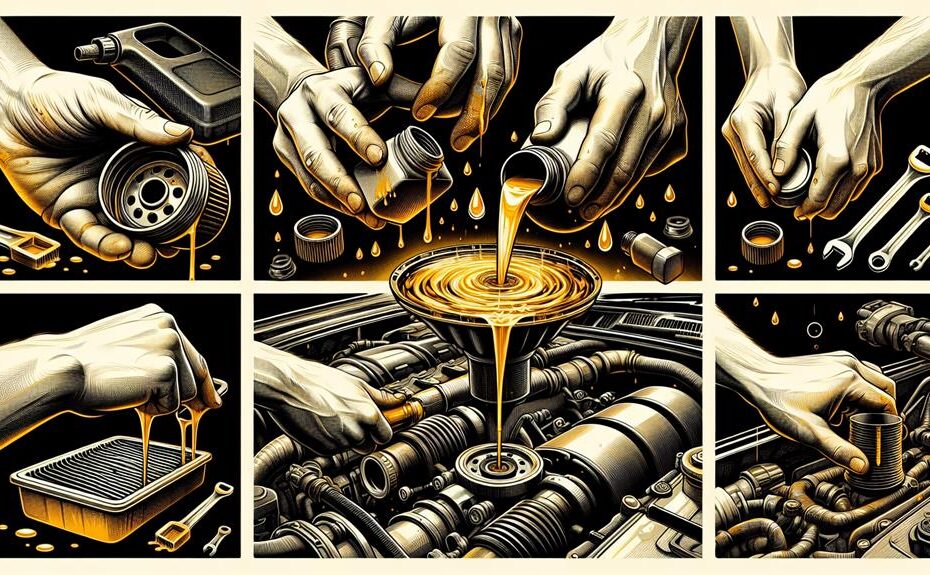When it comes to maintaining your vehicle, think of your engine as the beating heart of your car. And just like you take measures to keep your heart healthy, it's equally important to take care of your engine to ensure smooth and efficient performance.
One crucial aspect of engine maintenance is regular oil changes. But what if there were ways to prolong the time between oil changes, without compromising the health of your engine?
In this discussion, we will explore some top tips that can help you extend the intervals between oil changes, saving you time and money in the long run.
Key Takeaways
- Choosing the right oil type and viscosity is crucial to prevent engine damage and ensure optimal performance.
- Following the manufacturer's recommendations for oil type and regular oil changes can improve fuel efficiency and protect the engine.
- Keeping the engine clean and free from dirt and debris leads to improved fuel economy, reduced emissions, and minimizes the risk of costly repairs.
- Regularly checking and replacing the oil filter, as well as monitoring and topping up oil levels as needed, helps maintain oil quality and ensures proper lubrication for the engine.
Choose the Right Oil Type
To ensure optimal performance and longevity of your vehicle's engine, it's crucial to select the appropriate oil type. Choosing the right oil type is an essential aspect of preventive maintenance for your vehicle. The oil's viscosity, or thickness, is a key factor in determining its suitability for your engine.
Oil viscosity refers to the resistance of the oil to flow at different temperatures. It's denoted by a numerical value followed by the letter 'W' (which stands for winter) and another numerical value. For example, 5W-30 is a common viscosity rating. The first number indicates how the oil flows at low temperatures, while the second number indicates its flow at high temperatures. It's crucial to choose an oil with the proper viscosity range recommended by the vehicle manufacturer.
Using oil with the wrong viscosity can lead to engine damage. If the oil is too thick, it may not flow properly, resulting in inadequate lubrication. On the other hand, if the oil is too thin, it may not provide sufficient protection against friction and wear. Therefore, selecting the correct oil viscosity is essential to ensure that your engine operates smoothly and efficiently.
Regularly checking and maintaining the right oil viscosity is a vital part of preventive maintenance. Consult your vehicle's owner manual or seek professional advice to determine the appropriate oil type and viscosity for your specific vehicle.
Follow the Manufacturer's Recommendations
Follow the manufacturer's recommendations for oil change intervals to ensure optimal engine performance and longevity. Proper maintenance is crucial for the smooth operation of your vehicle's engine. By adhering to the manufacturer's guidelines, you can avoid unnecessary wear and tear and potential engine damage.
Here are four reasons why following the manufacturer's recommendations is important:
- Engine Protection: Manufacturers have extensive knowledge of their engines and provide specific intervals for oil changes based on their design and performance. Following these recommendations ensures that your engine receives the necessary protection against friction, heat, and contaminants.
- Warranty Maintenance: Many vehicles come with warranties that require regular maintenance, including oil changes. By following the manufacturer's recommendations, you stay compliant with the warranty conditions and avoid voiding any coverage.
- Fuel Efficiency: Regular oil changes help maintain proper lubrication, reducing friction and improving fuel efficiency. Following the manufacturer's recommendations ensures that your engine operates at its peak performance, helping you save money on fuel costs.
- Benefits of Synthetic Oil: Some manufacturers recommend using synthetic oil, which offers superior performance and protection compared to conventional oil. Synthetic oil provides better lubrication, improved engine cleanliness, and enhanced resistance to breakdown, resulting in extended oil change intervals and overall better engine performance.
Keep Your Engine Clean
By maintaining a clean engine, you can further enhance the performance and longevity of your vehicle, in line with the manufacturer's recommendations for oil change intervals. Regular maintenance and cleanliness are vital for the optimal functioning of your engine. When your engine is clean, it operates more efficiently, resulting in improved fuel economy and reduced emissions. Moreover, a clean engine minimizes the risk of costly repairs and breakdowns, ensuring a smooth and hassle-free driving experience.
Here are the key benefits of engine cleanliness:
| Benefits of Engine Cleanliness | Importance of Regular Maintenance |
|---|---|
| Improved Performance | Prolongs Engine Life |
| Enhanced Fuel Efficiency | Prevents Costly Repairs |
| Reduced Emissions | Ensures Smooth Driving Experience |
Regular maintenance is crucial to maintaining engine cleanliness. It includes changing the oil and oil filter at recommended intervals, inspecting and replacing air filters, and using high-quality fuel and lubricants. Additionally, keeping the engine bay clean and free from dirt, debris, and leaks helps prevent the buildup of grime and contaminants.
Regularly Check and Replace the Oil Filter
Regularly checking and replacing the oil filter is a critical maintenance task that ensures the optimal performance and longevity of your engine. By maintaining proper oil viscosity and using genuine oil filters, you can effectively prolong oil change intervals and protect your engine from potential damage.
Here are four reasons why regularly checking and replacing the oil filter is crucial:
- Efficient filtration: Oil filters trap contaminants such as dirt, debris, and metal particles, preventing them from circulating in the engine. Over time, these contaminants can cause engine wear and reduce performance. Regularly replacing the oil filter ensures that it's functioning properly and efficiently removing harmful particles from the oil.
- Sustained oil quality: The oil filter plays a vital role in maintaining the quality of the engine oil. It helps remove impurities and keeps the oil clean, allowing it to effectively lubricate and protect the engine components. By regularly checking and replacing the oil filter, you ensure that the oil remains in good condition for a longer time.
- Avoid engine damage: A clogged or damaged oil filter can lead to insufficient oil flow, which can result in engine overheating and increased wear and tear. By regularly inspecting and replacing the oil filter, you reduce the risk of engine damage and costly repairs.
- Optimal engine performance: When the oil filter is functioning properly, the engine receives clean oil that can effectively lubricate and protect its components. This leads to improved engine performance, better fuel efficiency, and a smoother driving experience.
Monitor Oil Levels and Top up as Needed
To ensure optimal engine performance and prevent potential damage, it is important to consistently monitor the oil levels in your vehicle and top up as needed. Proper maintenance of oil levels is crucial for the longevity of your engine and the overall efficiency of your vehicle. Regularly checking and topping up the oil ensures that your engine is adequately lubricated, reducing friction and wear on moving parts.
To help you stay on top of your oil levels, here are some best practices to follow:
| Oil Change Frequency | Oil Level Monitoring | Topping Up |
|---|---|---|
| Follow manufacturer's recommendations for oil change intervals. | Check the oil level every month or before long trips. | Top up the oil if it falls below the recommended level. |
| Consider your driving conditions and habits when determining oil change frequency. | Use the dipstick to check the oil level accurately. | Use the recommended oil type and viscosity for your vehicle. |
| Conduct regular visual inspections for any signs of oil leaks. | Consult your vehicle's manual for specific instructions on checking the oil level. | Use a funnel to avoid spillage and overfilling. |
Frequently Asked Questions
What Are the Common Signs That Indicate the Need for an Oil Change?
You should be aware of signs that indicate the need for an oil change. These signs, such as a dark or dirty oil color, low oil level, or engine noise, signal the importance of regular oil changes.
Can I Switch to a Different Oil Type if It's Not Specified by the Manufacturer?
You can switch to a different oil type if not specified by the manufacturer. Using synthetic oil provides benefits like improved engine performance and longer oil change intervals. Consult your owner's manual for compatibility.
How Often Should I Check the Oil Level in My Vehicle?
To ensure optimal engine performance, it is crucial to regularly monitor your vehicle's oil level. Factors like mileage, driving conditions, and engine health can affect oil consumption. Check your oil level at least once a month.
Is It Necessary to Change the Oil Filter Every Time I Change the Oil?
Yes, it is necessary to change the oil filter every time you change the oil. Oil filter maintenance is crucial for the longevity of your engine. Regularly replacing the oil filter helps remove contaminants and ensures proper lubrication.
Can I Use Synthetic Oil Instead of Conventional Oil to Prolong Oil Change Intervals?
You can use synthetic oil instead of conventional oil to prolong oil change intervals. Synthetic oil offers numerous benefits for engine performance and is considered better for your car compared to conventional oil.
Conclusion
Congratulations! By following these top tips, you have unlocked the secret to prolonging your oil change intervals. Like a well-oiled machine, your engine will purr with gratitude.
With the right oil type, regular maintenance, and keeping a watchful eye on oil levels, you'll be cruising smoothly down the road of efficiency.
Embrace these practices and revel in the satisfaction of a well-maintained engine, knowing you've mastered the art of maximizing performance.
Your vehicle will thank you, and you'll save time and money in the process.
Happy driving!



